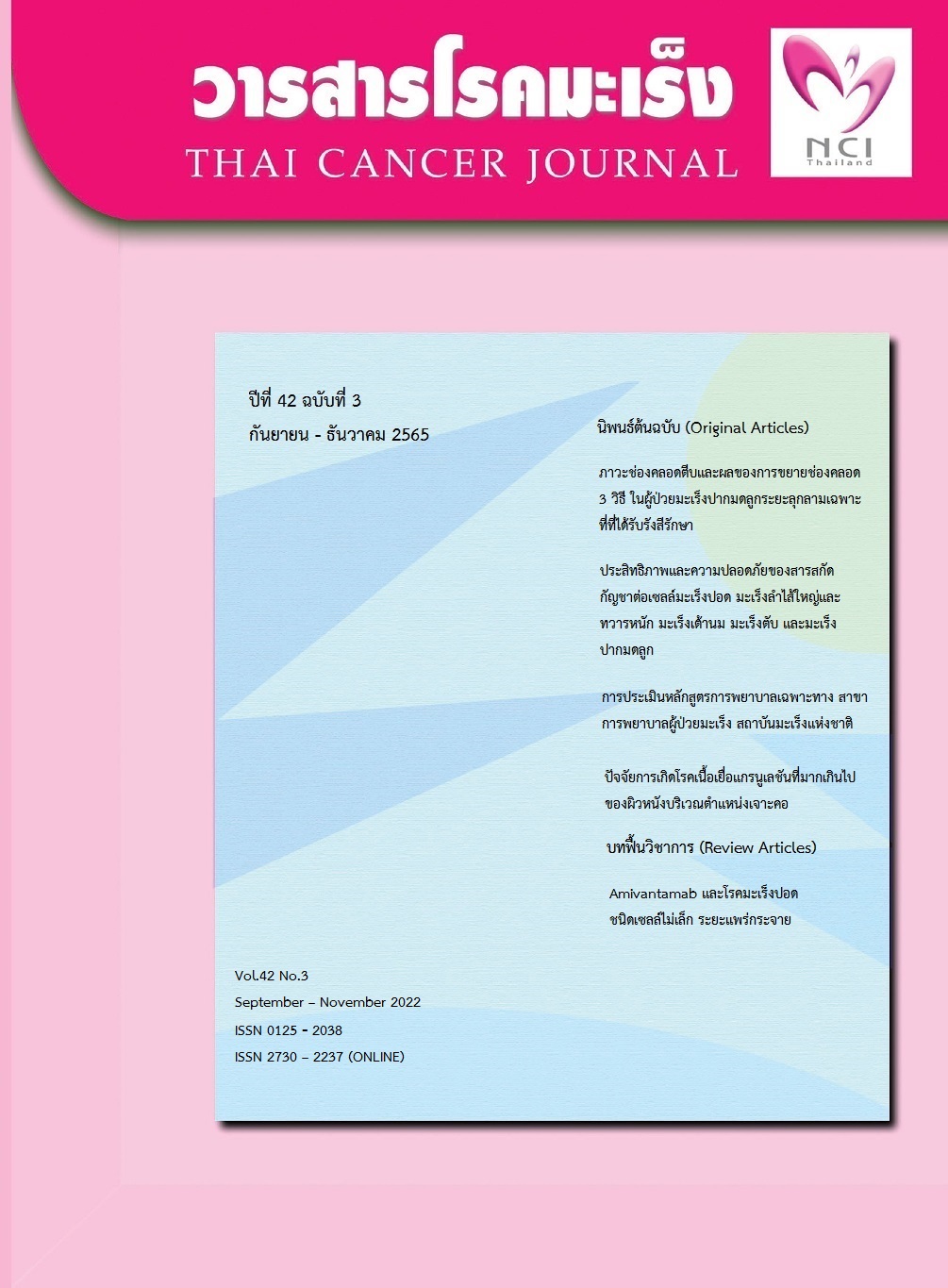Evaluation of the Program in Nursing Specialty in Oncology Nurse, National Cancer Institute
Keywords:
evaluation of the program, nursing specialty, oncology nurseAbstract
The purpose of this study was to evaluate specialized nursing courses. Cancer Nursing (revised curriculum B.E. 2015-2019) according to the CIPP Model. The samples were 201 certified oncology nurse in 2016-2019 and their supervisors. Data was collected using questionnaires developed by the researcher.together with the application of competency assessment in cancer nursing care, with reliability values of 0.86 and 0.83, respectively. Descriptive statistics were used to analyze quantitative data, and domain and content analysis were used to analyze qualitative data. The results showed that curriculum assessment in terms of course context was at the highest level. There is an opinion that the context of the curriculum was highest level (4.56+0.74), input (4.41+0.66), and process (4.39+0.73) was high level. In terms of productivity, the graduates had a high level of competency in nursing care for cancer patients in all 8 areas. and the commanding officer There is an opinion that the graduates had a high level of competency in nursing care for cancer patients in all 7 areas with the exception of clinical nursing practice, which was related at a moderate level. Applying knowledge to the management of the cancer care system and nursing practice The graduates can put their knowledge to use by integrating it into practice, providing care for cancer patients and their families, as well as using a network to provide for the patients. It was suggested to create a forum where the trainees may discuss their expertise, as well as their professional and academic accomplishments, in regard to caring for cancer patients. Able to broaden the body of knowledge given both domestically and internationally.
References
Mira VL, Follador NN, Ferrari CRS, Oliveira LFMN, Silva JAM, Santos, PTD. Evaluation of effectiveness of training of nursing professionals: A correlational study. Online Brazilian Journal of Nursing 2012;11:595-606.
ภารกิจด้านการพยาบาล สถาบันมะเร็งแห่งชาติ. หลักสูตรฝึกอบรมการพยาบาลเฉพาะทาง สาขาการพยาบาลผู้ป่วยมะเร็ง; 2558.
Stufflebeam DL, Coryn CLS. Evaluation: Theory, models and applications (2nd eds.). San Francisco: Jossey-Bass; 2014.
ริชัย กาญจนวาสี. โมเดล CIPP ที่เปลี่ยนไป: ความหมาย ความสําคัญและพัฒนาการ. สารสมาคมวิจัยสังคมศาสตร์แห่งประเทศไทย 2558;2(1):3-10.
บุญชม ศรีสะอาด. การวิจัยเบื้องต้น (พิมพ์ครั้งที่ 10). กรุงเทพฯ : สุวีริยาสาส์น; 2560.
Thienthong H, Tiansawad S, Wonghongkul T, Tonmukayakul O. Development of an oncology
nursing competency scale for general professional nurses in Thailand. Chiang Mai University Journal of Natural Sciences 2011;10(1):2-14.
สภาการพยาบาล. ประกาศสภาการพยาบาล เรื่อง สมรรถนะหลักของผู้สำเร็จการศึกษาการพยาบาลเฉพาะทางสาขาพยาบาลศาสตร์; 2561.
สภาการพยาบาล. ประกาศสภาการพยาบาล เรื่อง เกณฑ์การจัดทําหลักสูตรฝึกอบรมการพยาบาลเฉพาะทางและการบริหารจัดการหลักสูตร พ.ศ. 2557. https://www.tnmc.or.th/images/userfiles/files/H007.pdf
Best JW. Research in education. New jersey: Prentice-Hall; 1981.
อภิสิทธิ์ คุณวรปัญญา, คำรณ โชธนะโชติ. การประเมินผลหลักสูตรฝึกอบรมความรู้เกี่ยวกับการวิจัยทางสังคมศาสตร์. วารสารการพัฒนางานประจาสู่งานวิจัย 2557;1(1):49-59.
รวมพร มินานนท์ ,จินตนา พรสัมฤทธิ์โชค, จิราพัชร์ ปัญญาดี, อัญพัชญ์ วิวัฒน์กมลชัย, ชญาณิศา เขมทัศน์. ปัจจัยที่มีผลต่อการจัดการเรียนการสอนในกระบวนวิชาหลักการและเทคนิคการพยาบาลภาคทฤษฏีและภาคปฏิบัติวิทยาลัยพยาบาลบรมราชชนนี เชียงใหม่. พยาบาลสาร 2556;40(4):126-38.
วราพร บุญมี. สื่อการสอนกับการเรียนรู้ในศตวรรษที่ 21. วารสารการบริหารนิติบุคคลและนวัตกรรมท้องถิ่น
;7(9):373-85.
พรรณี กัณหดิลก, ตรีชฎา ปุ่นสำเริง, ชุติมา มาลัย. กลยุทธ์การสอนด้วยหลักฐานเชิงประจักษ์ทางการพยาบาล. วารสารการพยาบาลและการดูแลสุขภาพ 2560;35(4):34-41.
Downloads
Published
Issue
Section
License
Copyright (c) 2022 Thailand's National Cancer Institute Foundation

This work is licensed under a Creative Commons Attribution-NonCommercial-NoDerivatives 4.0 International License.
บทความทีตีพิมพ์ในวารสารโรคมะเร็งนี้ถือว่าเป็นลิขสิทธิ์ของมูลนิธิสถาบันมะเร็งแห่งชาติ และผลงานวิชาการหรือวิจัยของคณะผู้เขียน ไม่ใช่ความคิดเห็นของบรรณาธิการหรือผู้จัดทํา







